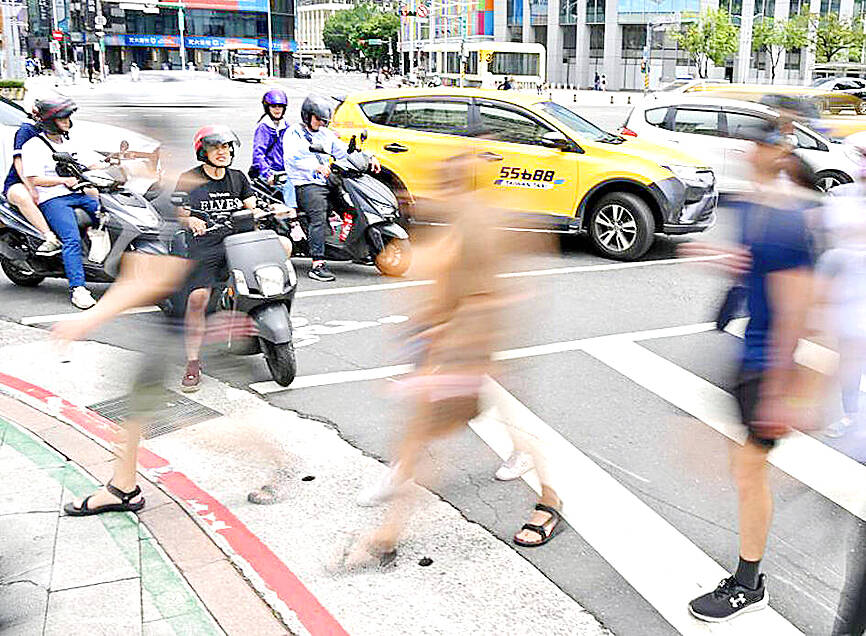The National Audit Office said it would ask the Cabinet to gather ministries to analyze the issue of driving under the influence of medication and review traffic regulations, as more people were estimated to have died from it than from traffic accidents involving alcohol last year.
More than 300 people die in traffic incidents in which a driver is impaired by medication every year, while 253 people had died in alcohol-related traffic incidents last year, the Taipei Pharmacists Association said.
A Taipei City Hospital survey showed that about one-third of the respondents had taken medicine before driving, with the most common being hypoglycemic agents (to lower blood sugar level), hypnotics and muscle relaxants, the audit office said.

Photo: Tu Chien-jung, Taipei Times
Commonly taken medicines often have side effects such as sleepiness, dizziness, reduced concentration and loss of coordination, it said.
Another survey by the association on 300 professional drivers of taxies, tour buses and heavy trucks showed that 19.5 percent had taken hypoglycemic agents, hypnotics or muscle relaxants before driving.
In general, people in Taiwan are unaware of the seriousness of driving under the influence of medication, but the Road Traffic Management and Penalty Act (道路交通管理處罰條例) only regulates and punishes driving under the influence of illicit drugs, hallucinogens, narcotics and other similar controlled drugs, the office said.
As the act does not regulate or punish driving under the influence of medication, it might be difficult to increase people’s awareness on its seriousness, it said.
Referencing the drug classification methods in France, the association and Taipei City Hospital have established a traffic safety drug classification system for Taiwan and are using it to raise public awareness.
In Hong Kong, people who drive under the influence of drugs that are not classified as illicit, but deprives them of their normal mental or physical faculties and seriously affects their ability to drive, might be subject to penalties.
They can be fined up to HK$25,000 (US$3,206) or sentenced to three years in prison, Hong Kong’s Road Traffic Ordinance says, adding that first-time offenders would have their driver’s license suspended for six months while it would be at least two years for the second offense.
The dangers of driving under the influence of medication is no less than that of alcohol or illicit drugs, but most people are unaware of it, which poses road safety risks, the office said.
The office said it has notified the Executive Yuan, asking it to gather the Ministry of Transportation and Communications and the Ministry of Health and Welfare to reference the road safety drug classification systems in other countries and improve the driving under the influence of medication prevention and control mechanism in Taiwan.
They can also use the National Health Insurance data to analyze the medicines that endanger driving safety, raise public awareness through hospitals and clinics, and review the traffic regulations and relevant penalties, it said.

The Coast Guard Administration (CGA) yesterday said it had deployed patrol vessels to expel a China Coast Guard ship and a Chinese fishing boat near Pratas Island (Dongsha Island, 東沙群島) in the South China Sea. The China Coast Guard vessel was 28 nautical miles (52km) northeast of Pratas at 6:15am on Thursday, approaching the island’s restricted waters, which extend 24 nautical miles from its shoreline, the CGA’s Dongsha-Nansha Branch said in a statement. The Tainan, a 2,000-tonne cutter, was deployed by the CGA to shadow the Chinese ship, which left the area at 2:39pm on Friday, the statement said. At 6:31pm on Friday,

The Chinese People’s Liberation Army Navy’s (PLAN) third aircraft carrier, the Fujian, would pose a steep challenge to Taiwan’s ability to defend itself against a full-scale invasion, a defense expert said yesterday. Institute of National Defense and Security Research analyst Chieh Chung (揭仲) made the comment hours after the PLAN confirmed the carrier recently passed through the Taiwan Strait to conduct “scientific research tests and training missions” in the South China Sea. China has two carriers in operation — the Liaoning and the Shandong — with the Fujian undergoing sea trials. Although the PLAN needs time to train the Fujian’s air wing and

The American Institute in Taiwan (AIT) put Taiwan in danger, Ma Ying-jeou Foundation director Hsiao Hsu-tsen (蕭旭岑) said yesterday, hours after the de facto US embassy said that Beijing had misinterpreted World War II-era documents to isolate Taiwan. The AIT’s comments harmed the Republic of China’s (ROC) national interests and contradicted a part of the “six assurances” stipulating that the US would not change its official position on Taiwan’s sovereignty, Hsiao said. The “six assurances,” which were given by then-US president Ronald Reagan to Taiwan in 1982, say that Washington would not set a date for ending arm sales to Taiwan, consult

A Taiwanese academic yesterday said that Chinese Ambassador to Denmark Wang Xuefeng (王雪峰) disrespected Denmark and Japan when he earlier this year allegedly asked Japan’s embassy to make Taiwan’s representatives leave an event in Copenhagen. The Danish-language Berlingske on Sunday reported the incident in an article with the headline “The emperor’s birthday ended in drama in Copenhagen: More conflict may be on the way between Denmark and China.” It said that on Feb. 26, the Japanese embassy in Denmark held an event for Japanese Emperor Naruhito’s birthday, with about 200 guests in attendance, including representatives from Taiwan. After addressing the Japanese hosts, Wang